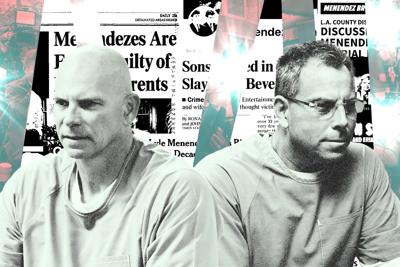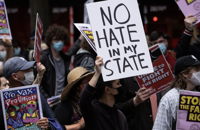
Illustration by Gabriel Hongsdusit, CalMatters
Two Ivy League brothers. Two Beverly Hills parents. Two tabloid murders. The true crime spotlight refuses to let go of Erik and Lyle Menendez.
From the first news of their arrest in 1990, the Menendez brothers have been defined by sensationalized headlines. Their separate trials dominated cable television in 1993. Plot twists of witness tampering, an unscrupulously recorded therapy confession and claims of lifelong sexual abuse all played out in the public eye before juries deadlocked.
And in the immediate echo of O.J Simpson’s “not guilty,” their subsequent murder convictions, decades of incarceration and new shot at freedom continue to bring intense media scrutiny — from CourtTV to YouTube to Netflix and Kim Kardashian.
So why would their recent parole hearings draw any less attention?
Thousands of parole proceedings go largely unnoticed each year. But on Aug. 21 and 22, the Menendez hearings brought heightened focus to what is normally a standard procedure that, in theory, balances concerns for public safety against giving offenders a genuine second chance opportunity.
The outcome of each brother’s hearing was not surprising. Both received three-year denials, which are common.
But when the list of attendees includes Gov. Gavin Newsom’s spokesperson Diana Crofts-Pelayo — as well as the Board of Parole Hearings Executive Officer Scott Wyckoff and a Los Angeles Times reporter to update dozens of other news outlets — a common event turns almost circus-like.
“Sometimes the story or the myth behind the case comes to dominate the conversation about the case,” said UC Law San Francisco professor Hadar Aviram, an expert in parole procedures. She added that those myths “Sometimes completely (eclipse) the actual people who were involved in the case.” an expert in parole procedures. Aviram is the author of “Yesterday’s Monsters“, which documents attempts by Manson Family members to gain parole.
“People who only knew this story (of the Menendez brothers) through the popular culture narrative around this murder experienced it through these very lurid hues portrayed in made-for TV movies and tabloid stories and things like that,” she said.
Last month’s drama peaked as more than a dozen victims – relatives of both the brothers and their parents – were set to testify in support of Lyle on Aug. 22. Then an audio recording of Erik’s hearing the day before was broadcast nationwide, throwing Lyle’s hearing into momentary chaos.
Audio files are rarely, if ever, made public, and certainly not less than 24 hours after a hearing.
“We are sitting here expecting Mr. (Lyle) Menendez to follow every single rule in order to be released back into the community,” his attorney Heidi Rummel, said during his proceeding. “And in the middle of his hearing, we find out that CDCR’s (the California Department of Corrections and Rehabilitation is) not even following their own rules. It’s outrageous.”
Presiding commissioner Julie Garland paused the hearing to confer privately with Wyckoff, but then conceded that releasing the audio via public records request from an L.A. television station was, indeed, part of the parole board’s plan all along.
Unlike ordinary hearings, everyone involved in this one knew they would be playing to the media as well.
A governor’s decision
If either Menendez had been found suitable for parole, Newsom eventually would have had to decide whether to veto their release. It’s an executive power exclusive to governors in only two states, California and Oklahoma. Usually, Newsom’s office waits to review official transcripts. This time, Crofts-Pelayo observed both hearings for him from start to finish.
Newsom has chosen to revoke grants of parole to other high profile offenders throughout his time as governor, including Robert F. Kennedy assassin Sirhan Sirhan and Manson Family members Leslie Van Houten, Patricia Krenwinkel and Bruce Davis.
Parole board commissioners found each of them, all now in their 70s or older, suitable through the appropriate legal process. Newsom cited an “unreasonable risk of danger to public safety” and overrode those decisions. Van Houten in 2023 needed the California 2nd District Court of Appeal to overrule the governor and allow her to be released.
Newsom’s intervention may stem more from public perception rather than issues of actual danger. In high profile cases that potentially cause public outcry and huge social media buzz, fairness and safety often become politicized.
“Any politician knows that there’s very little political advantage to be derived from being in favor of prisoners and from releasing people like that that have huge notoriety associated with them,” said Aviram, the legal scholar. “And of course, that’s going to impact the way that the messaging is going to come down from the governor’s mansion.”
Menendez attorney Mark Geragos does not believe the parole board offered the brothers a fair shake, or that the purpose of the lengthy all-day hearings was anything but performative. “It was obviously rigged,” he said. “They were just method actors in a pre-ordained script. This was nonsense.”
In one important way, however, the brothers may have also benefited from the decades of attention they’ve endured. They were eligible for parole only because they’d recently been resentenced from life without parole through a review process that itself can be arbitrary and subjective.
Attorney and legal analyst Laura Sheppard has represented hundreds of lifers in parole and resentencing hearings. According to her, the Menendez notoriety and their success at resentencing underscores a great discrepancy in how some life without parole offenders get their cases reviewed.
“It also seems to have influenced the parole board and governor’s office to generate a new process to start to make similar relief available to other (life without parole) sentenced offenders who don’t have Erik and Lyle’s notoriety,” said Sheppard.
“That is a wonderful thing, because until then, it looked as though Erik and Lyle’s notoriety was going to gain them an advantage that other similarly situated prisoners without fame or money cannot access.”
The Board of Parole Hearings recently announced a proposed change in regulations that would help formalize how commutations and petitions for resentencing are granted.
Will Erik and Lyle ever see daylight?
A month after the parole denials, Los Angeles Superior Court Judge William C. Ryan dealt the brothers another blow. He ruled that newly reported evidence that corroborates the sexual abuse was not enough to warrant a new trial.
Barring a Newsom commutation or clemency, a parole board hearing looks to be the only way out of prison for them right now.
Many parole hearings boil down to whether the board believes the individual is being authentic. Is their rehabilitation and personal transformation genuine and substantial? Or is their grasp of self-help mantras and buzzwords merely performative?
For their hearings, Erik and Lyle Menendez each sat alone before a computer screen in the R.J. Donovan Correctional Facility in San Diego, accompanied only by two correctional officers. Everyone else — commissioners, attorneys and all other parties — participated virtually.
“The purpose of this hearing is not to retry your case, nor is the purpose of this hearing to put your parents on trial,” presiding commissioner Robert Barton told Erik. “The purpose of this hearing is to determine whether or not you currently pose an unreasonable risk to public safety.”
Commissioners questioned each Menendez about the underlying “nexus” of their crime. Successful parole suitability requires offenders to show insight into why they did what they did.
Without relitigating or making excuses, this line of reasoning is an essential component of rehabilitation. If a person doesn’t fully understand the flaws in their thinking that contributed to their criminal decisions, then they are considered far more prone to repeat them.
“Two things can be true that seem opposite at the same time and yet be true,” Erik Menendez said in explaining his immense fear of his father while also addressing his need to act out and rebel in small ways.
Assessing risk of recidivism
Current legal standards now recognize the rash and impulsive cognitive functions of brains that have not yet fully developed. Most experts agree that age 26 is the threshold for maturity. Erik and Lyle were 18 and 21 at the time of the murders.
In addition to meeting parole eligibility requirements under youth offender statutes based on their age when they committed the murders, both brothers meet elderly parole eligibility criteria based on their age and time served.
“There’s robust evidence for this, that people age out of violent crime in their mid to late 20s, which is to say, folks that are already in their 50s and above, the risk that they personally pose to the public is very minimal,” said Aviram.
“So we’re kind of pulled in two different directions, right? On one hand, we have the optics of releasing somebody who’s done a long sentence. And on the other hand, we have the reality that despite this person’s notoriety, the actual odds that this person is going to commit more crime are close to zero.”
During the hearings, commissioners spent hours parsing through each brother’s prison record — highlighting documented incidents from as far back as the 90s and asking for detailed explanations.
Despite comprehensive documentation of their positive accomplishments throughout years of incarceration, each Menendez needed to address negative write-ups for a multitude of rules violations, such as substance abuse, contraband items and misuse of institutional computers.
Most of the violations occurred before they had any chance at parole or any real incentive to follow correctional department rules.
Many of the violations took place inside some of the worst and most volatile prisons — environments where young men conform to the social norms of their peers or get dealt with violently by those peers. The realistic fear of prison gangs influences their decisions.
From the onset of their incarceration, Erik and Lyle were defined by their notoriety and supposed affluence — quite often becoming the targets of both the prison community and staff.
Hearing records detail how some peers tried to pressure, intimidate and extort them, even physically attack them just for fun. Being known as self-admitted victims of sexual abuse did not help.
Some correctional officers scrutinized their conduct to a higher degree. Others monitored their institutional calls and electronic messages for lucrative information.
Both brothers married women they met through prison correspondence. Their communications and expected visiting schedules were sometimes sold to paparazzi by staff.
‘Not the end’
Housed at separate facilities for two decades, they persevered independently without resorting to violence. They participated in positive programming, achieved college educations and established trauma support groups. Erik worked as a hospice caregiver for years and established programs to help the elderly.
They also purchased and used illegally distributed cell phones and were each written up for the violations as recently as November 2024. Those violations would prove fateful for parole.
The commissioners had to try and reconcile the good work versus the bad conduct and also acknowledge the wide network of Menendez family victims — close relatives of the murdered parents — who support and endorse Erik and Lyle for parole. Multiple family members corroborate the brothers’ stories of trauma and abuse since birth.
“Two things can be true,” said Commissioner Barton in parroting some of Erik’s words. “They can love and forgive you, and you can still be found unsuitable for parole.
“You can have remorse but still show antisocial traits and criminal behavior.”
The average parole hearing might last two to three hours from start to finish. Each of the Menendez’s went almost 12 hours. At the end of all the questions and answers and testimonials, each brother’s chance at parole hinged mostly on their individual cell phone use.
“You have been a model inmate in many ways, who has demonstrated the potential for change,” Commissioner Julie Garland said to Lyle. “But despite all those outward positives, we see in two main areas that you still struggle with antisocial personality traits of deception and rationalization, minimization and rule breaking, that continue to lie beneath that positive surface.”
Regardless of the surprise release of the audio files, and over the objections of attorneys and the victims’ family, Lyle’s parole hearing ended much the same as Erik’s.
Each brother received a three-year denial, which leaves open the possibility for a new hearing in 18 months. The parole board usually reviews the previous proceedings to see how the offender responds to assessment and recommendations.
The main priority is to demonstrate consistent disciplinary-free conduct — no write-ups, no rules violations.
“This denial is … not the end,” said Garland. “It is a way for you to spend some time to demonstrate and to practice what you preach about who you are… Don’t be somebody different behind closed doors.”
Joe Garcia is a California Local News fellow.










(0) comments
Welcome to the discussion.
Log In
Keep it Clean. Please avoid obscene, vulgar, lewd, racist or sexually-oriented language.
PLEASE TURN OFF YOUR CAPS LOCK.
Don't Threaten. Threats of harming another person will not be tolerated.
Be Truthful. Don't knowingly lie about anyone or anything.
Be Nice. No racism, sexism or any sort of -ism that is degrading to another person.
Be Proactive. Use the 'Report' link on each comment to let us know of abusive posts.
Share with Us. We'd love to hear eyewitness accounts, the history behind an article.